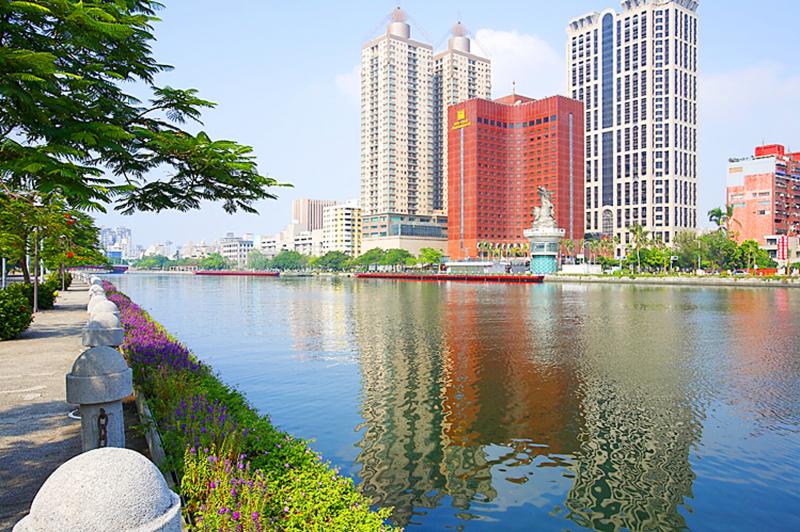Ambassador Hotels and Restaurants (國賓飯店) on Tuesday created a chief executive officer’s post to be concurrently held by its chairman, Emmet Hsu (許育瑞), to manage urban renewal for its flagship property in Taipei.
Hsu, also chairman of affiliate Yeangder Group (仰德集團) — which owns HCT Logistics Co (新竹物流), Shihlin Electric & Engineering Corp (士林電機) and a high school — aims to turn the 56-year-old Ambassador Hotel Taipei (台北國賓飯店) and two adjacent apartment buildings into a mixed-use complex.
The complex is to feature twin high-rise buildings — one for an upscale hotel and the other for luxury apartments — to boost floor space and property value, the company said in a Taiwan Stock Exchange filing after a board meeting.

Photo courtesy of Ambassador Hotels and Restaurants
Despite several rounds of renovations, there is still much to be desired in terms of floor design and overall competitiveness for Ambassador Hotel Taipei, the nation’s first private-run five-star hotel after the government-run Grand Hotel (圓山飯店), the company said, adding that it is time to start from scratch.
The hospitality chain, which also owns Ambassador Hotel Kaohsiung (高雄國賓飯店) and Ambassador Hotel Hsinchu (新竹國賓飯店), began to assess the possibility of urban renewal following the outbreak of COVID-19, which brought international tourism to a sudden halt in March, officials said.
Japanese travelers accounted for 70 percent of its clientele prior to the COVID-19 pandemic.
Ambassador Hotel Taipei plans to cease operation in 2022, the second hotel in Taipei to exit the market to pave the way for regeneration, following Leofoo Hotel (六福客棧), which closed at the end of May.
While hotels in most parts of Taiwan have emerged from the virus shock, business remains poor for facilities in Taipei due to their heavy dependence on foreign business travelers.
Ambassador Hotels and Restaurants said it might partner with international hotel brands after the renewal project is completed.
The group set up a property arm in June to take charge of real-estate development headed by the conglomerate’s consultant, Frank Lin (林興國), it said.
The board meeting also decided that chief operating officer John Hsieh (謝漢章) would double as president, while its current president Hubert Lee (李昌霖), the younger brother of Hsu, would be in charge of special projects.
The arrangements suggest that Lee would become less involved in decisionmaking for the hotel chain and focus on the local operations of the McDonald’s fast-food chain, local media reported yesterday.
The board appointed Hsu Chia-yao (許家堯), the eldest son of Emmet Hsu, the group’s vice president and special assistant to the chairman, the filing said.

TECH BOOST: New TSMC wafer fabs in Arizona are to dramatically improve US advanced chip production, a report by market research firm TrendForce said With Taiwan Semiconductor Manufacturing Co (TSMC, 台積電) pouring large funds into Arizona, the US is expected to see an improvement in its status to become the second-largest maker of advanced semiconductors in 2027, Taipei-based market researcher TrendForce Corp (集邦科技) said in a report last week. TrendForce estimates the US would account for a 21 percent share in the global advanced integrated circuit (IC) production market by 2027, sharply up from the current 9 percent, as TSMC is investing US$65 billion to build three wafer fabs in Arizona, the report said. TrendForce defined the advanced chipmaking processes as the 7-nanometer process or more

China’s Huawei Technologies Co (華為) plans to start mass-producing its most advanced artificial intelligence (AI) chip in the first quarter of next year, even as it struggles to make enough chips due to US restrictions, two people familiar with the matter said. The telecoms conglomerate has sent samples of the Ascend 910C — its newest chip, meant to rival those made by US chipmaker Nvidia Corp — to some technology firms and started taking orders, the sources told Reuters. The 910C is being made by top Chinese contract chipmaker Semiconductor Manufacturing International Corp (SMIC, 中芯) on its N+2 process, but a lack

Who would not want a social media audience that grows without new content? During the three years she paused production of her short do-it-yourself (DIY) farmer’s lifestyle videos, Chinese vlogger Li Ziqi (李子柒), 34, has seen her YouTube subscribers increase to 20.2 million from about 14 million. While YouTube is banned in China, her fan base there — although not the size of YouTube’s MrBeast, who has 330 million subscribers — is close to 100 million across the country’s social media platforms Douyin (抖音), Sina Weibo (新浪微博) and Xiaohongshu (小紅書). When Li finally released new videos last week — ending what has

OPEN SCIENCE: International collaboration on math and science will persevere even if the incoming Trump administration imposes strict controls, Nvidia’s CEO said Nvidia Corp CEO Jensen Huang (黃仁勳) said on Saturday that global cooperation in technology would continue even if the incoming US administration imposes stricter export controls on advanced computing products. US president-elect Donald Trump, in his first term in office, imposed restrictions on the sale of US technology to China citing national security — a policy continued under US President Joe Biden. The curbs forced Nvidia, the world’s leading maker of chips used for artificial intelligence (AI) applications, to change its product lineup in China. The US chipmaking giant last week reported record-high quarterly revenue on the back of strong AI chip